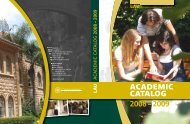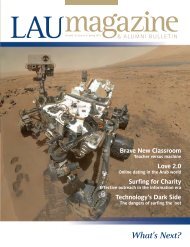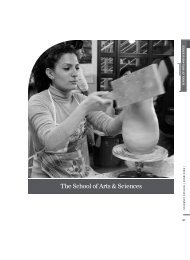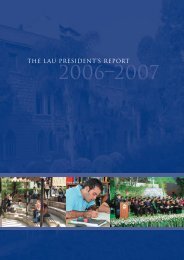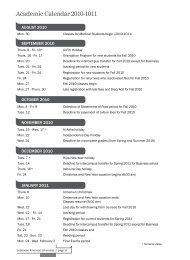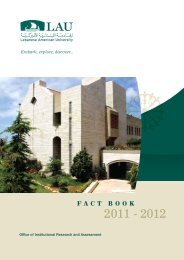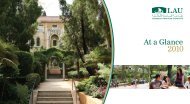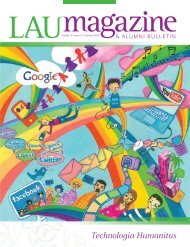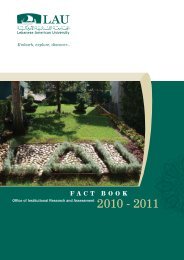academic-catalog2011.. - LAU Publications - Lebanese American ...
academic-catalog2011.. - LAU Publications - Lebanese American ...
academic-catalog2011.. - LAU Publications - Lebanese American ...
You also want an ePaper? Increase the reach of your titles
YUMPU automatically turns print PDFs into web optimized ePapers that Google loves.
Department of Education<br />
COURSE DESCRIPTIONS<br />
EDUCATION (UNDERGRADUATE)<br />
EDU201 Fundamentals of Education<br />
[3-0, 3 cr.]<br />
This course is an introduction to the teaching<br />
profession, providing a comprehensive<br />
examination of the historical, philosophical,<br />
and social foundations of education, as well as<br />
significant contemporary educational issues.<br />
EDU202 Observation and Curriculum<br />
[1-2, 3 cr.]<br />
This course covers the integration of the study<br />
of curriculum development along with a field<br />
experience. Emphasis is on the strategies<br />
and techniques for observing and recording<br />
students’ behaviours in the classroom where<br />
the student teacher spends 60 semester<br />
hours.<br />
EDU205 Safety and Health [3-0, 3 cr.]<br />
This course is a review of the integrated holistic<br />
approach of health and safety practices<br />
recommended for childcare, including<br />
information on common diseases, health<br />
problems, nutrition, and safety issues.<br />
EDU211 Mathematics for Elementary<br />
Teachers [3-0, 3 cr.]<br />
This course is a comprehensive review of the<br />
mathematics needed by teachers, and the<br />
mathematics taught at the elementary level<br />
(grades 1 through 6). The course entails an<br />
insightful understanding of the mathematical<br />
concepts, the nature and stages of the<br />
development of mathematical knowledge, the<br />
impact of new technologies (calculators and<br />
computers) on the elementary mathematics<br />
curricula, critical thinking and problem<br />
solving strategies, etc…, with emphasis on the<br />
new topics in the elementary mathematics<br />
curricula.<br />
EDU212 Science for Elementary Teachers<br />
[3-0, 3 cr.]<br />
This course is a comprehensive review of the<br />
sciences taught at the elementary level (grades<br />
1 through 6). The course entails an insightful<br />
understanding of the scientific concepts, the<br />
learning cycle of the development of scientific<br />
knowledge, scientific method of investigation<br />
and inquiry, experimentation and laboratory<br />
skills, critical thinking and problem solving<br />
strategies, etc..., with emphasis on the new<br />
topics in elementary science curricula.<br />
EDU301 School Counseling [3-0, 3 cr.]<br />
This course is a study of the theory and<br />
practice of school counseling. Emphasis is on<br />
communication skills and basic intervention<br />
techniques that assist educators in dealing<br />
with a range of behavioural, emotional and<br />
vocational concerns at school.<br />
EDU303 Language Arts [3-0, 3 cr.]<br />
This is a training course designed to give<br />
students practice in the effective use of<br />
classroom English, and to extend their<br />
language teaching skills and techniques,<br />
with special emphasis on the communicative<br />
approach.<br />
EDU305 Applied Phonology* [3-0, 3 cr.]<br />
This course deals with phonetics and<br />
phonemics, phonological analysis including<br />
segmental (consonant and vowel), as well as<br />
supra-segmental (stress, intonations, juncture,<br />
pause, and rhythm) features, comparative<br />
analysis, and native language interference in<br />
second language learning. The course includes<br />
examples from a wide variety of languages,<br />
with special emphasis on the sound systems of<br />
English and Arabic. The course develops basic<br />
skills in comparative phonological analysis.<br />
EDU310 Computers in Education [3-0, 3 cr.]<br />
This course is designed to provide prospective<br />
teachers with broad knowledge, and practical<br />
activities, of the various instructional<br />
applications of computers. Topics include<br />
general knowledge about computers and<br />
their educational uses, simple computer<br />
programming as a means to enhance students’<br />
higher-order thinking, the evaluation, selection,<br />
and integration of educational software in<br />
teaching, and the learning of various subjects,<br />
as well as the use of the Web resources in<br />
teaching and learning. The course covers an<br />
overview of the new <strong>Lebanese</strong> Informatics<br />
curriculum.<br />
EDU311 The Teaching of Arabic as a Foreign<br />
Language [3-0, 3 cr.]<br />
This course is a study of the problems and<br />
methods of teaching Arabic as a foreign<br />
language, based on the findings of modern<br />
linguistic science. The course covers all<br />
the aspects of Arabic teaching including<br />
pronunciation, vocabulary, grammar, reading,<br />
writing, and testing. It handles curricular<br />
matters, and prepares students for their<br />
practice teaching experience.<br />
Prerequisite: ENG213 Introduction to Language,<br />
or the consent of the Instructor.<br />
<strong>Lebanese</strong> <strong>American</strong> University | page 132



